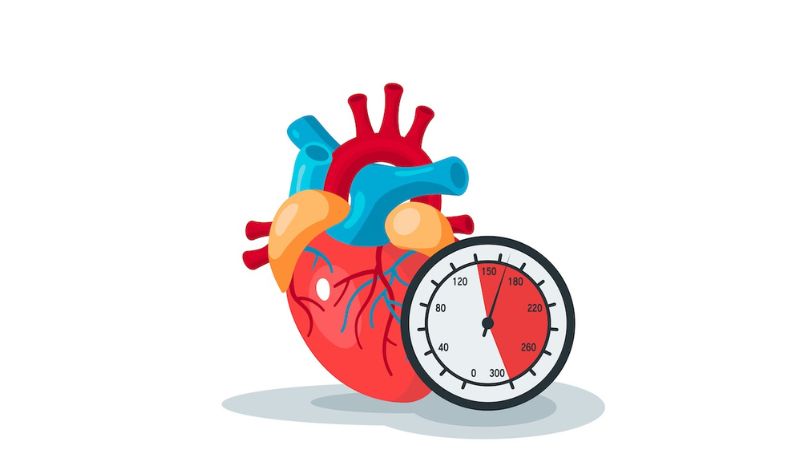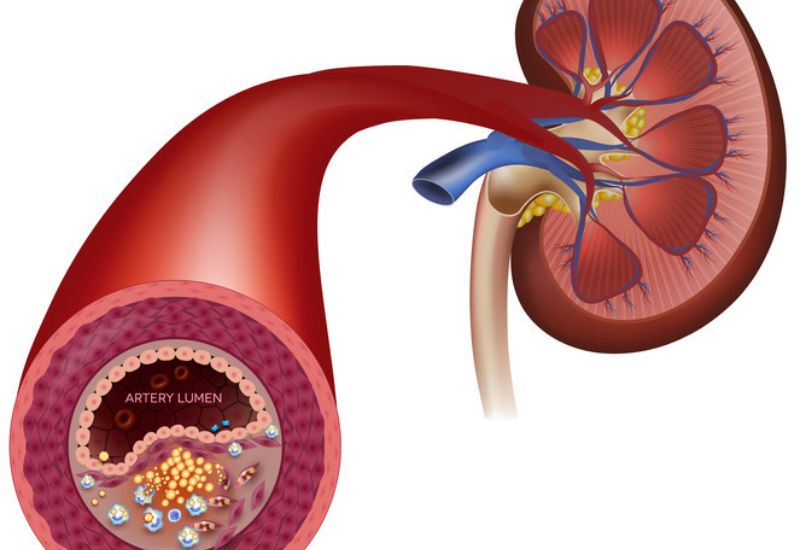Hypertension progresses quietly without obvious symptoms but can cause severe health consequences. Without proper management, it can lead to life-threatening conditions affecting the heart, brain, kidneys, and eyes. These hypertension complications not only lower a patient’s quality of life but may also pose a significant risk of mortality. Understanding these complications is essential for improving awareness, prevention, and blood pressure control within the community.
1. Cardiovascular Complications – The Most Common and Dangerous Outcomes
1.1. Heart Failure Due to Pressure Overload
One of the most frequent hypertension complications is heart failure. Chronically elevated blood pressure forces the heart to work harder to circulate blood, eventually causing the heart muscle to thicken and lose elasticity. Over time, this reduces the heart’s pumping efficiency, leading to symptoms such as fatigue, shortness of breath during exertion, and leg swelling in advanced stages.
1.2. Myocardial Infarction (Heart Attack)
Sustained hypertension damages the inner lining of arteries, promoting atherosclerotic plaque buildup. When the coronary arteries become narrowed or blocked, the risk of myocardial infarction increases. Symptoms often include chest pain, difficulty breathing, cold sweats, or even sudden loss of consciousness. This is a medical emergency requiring immediate attention.

Prolonged hypertension can lead to myocardial infarction.
1.3. Left Ventricular Hypertrophy – A Warning Sign of Impending Heart Failure
Left ventricular hypertrophy occurs as the heart adapts to prolonged high blood pressure. Although it may not produce symptoms initially, it raises the risk of arrhythmias, heart failure, and sudden cardiac death if not properly treated.
2. Brain Complications – The Risk of Stroke Lurks
2.1. Ischemic Stroke
Ischemic stroke is among the most severe hypertension complications and is often fatal. High blood pressure damages cerebral blood vessels, leading to clot formation and impaired blood flow to the brain. Symptoms may include sudden loss of consciousness, hemiplegia, or speech difficulties. Prompt treatment within the “golden window” (3–4.5 hours after symptom onset) is critical for recovery.
2.2. Hemorrhagic Stroke
Unlike ischemic stroke, hemorrhagic stroke results from the rupture of weakened blood vessels in the brain due to sudden spikes in blood pressure. This can cause internal bleeding and severe neurological damage. Patients may present with an intense headache, nausea, slurred speech, or rapid loss of consciousness. Immediate medical intervention is vital.
2.3. Cognitive Impairment and Dementia
Chronic hypertension causes small vessel damage in the brain, impairing blood flow and leading to memory loss, difficulty concentrating, and eventually vascular dementia. These long-term hypertension complications significantly impact the elderly’s independence and quality of life.
3. Renal Complications – Gradual Loss of Kidney Function
3.1. Chronic Kidney Disease
The kidneys are highly vascularized and sensitive to blood pressure changes. Persistent hypertension causes glomerular sclerosis, impairing the kidneys’ ability to filter waste. This damage often progresses silently until reaching late-stage kidney failure.
3.2. Elevated Creatinine and Proteinuria
Routine blood and urine tests in hypertensive patients may reveal elevated creatinine and protein in urine – early indicators of kidney damage. Without proper management, patients may progress to end-stage renal disease, requiring dialysis or kidney transplantation.

Hypertension may damage renal arteries and cause kidney failure.
4. Ocular Complications – Risk of Permanent Vision Loss
4.1. Hypertensive Retinopathy
High blood pressure damages retinal microvasculature, leading to complications like vessel narrowing, retinal hemorrhage, and optic disc swelling. Patients may experience blurred vision, floaters, or sudden vision loss in severe cases.
4.2. Malignant Hypertension and Blindness
Malignant hypertension, a rapidly progressing form of the condition, can cause acute optic disc swelling and irreversible blindness if not treated urgently. This is a medical emergency that requires immediate hospitalization.
5. Systemic Complications and Metabolic Disorders
5.1. Metabolic Syndrome
Hypertension is frequently associated with other risk factors such as obesity, dyslipidemia, and insulin resistance. Together, these form metabolic syndrome, a condition that greatly increases the risk of heart attack, stroke, and type 2 diabetes. Comprehensive management of these risk factors is essential.
5.2. Endothelial Dysfunction
Chronic high blood pressure damages the endothelium – the inner lining of blood vessels – impairing its ability to regulate vascular tone. This accelerates atherosclerosis and contributes to poor blood pressure control, even with medication.
6. How to Prevent Hypertension Complications Effectively
6.1. Adopt a Healthy Lifestyle
Preventing hypertension complications begins with lifestyle modifications. A heart-healthy diet low in salt and saturated fats, rich in vegetables, fruits, and potassium, is recommended. Regular physical activity (at least 30 minutes a day), weight control, and smoking cessation are also key.
6.2. Medication Compliance and Regular Checkups
Patients should strictly follow their physician’s prescriptions and avoid discontinuing medication when blood pressure appears controlled. Routine checkups are necessary to monitor blood pressure levels, kidney and heart function, and detect early signs of hypertension complications.

Regular blood pressure monitoring and maintaining stable levels help prevent serious complications.
Although hypertension is a chronic condition, it can be well managed with early intervention, adherence to treatment, and preventive measures. Many hypertension complications develop silently, but their consequences can be devastating. Staying informed and vigilant helps protect vital organs like the heart, brain, kidneys, and eyes from irreversible damage.








